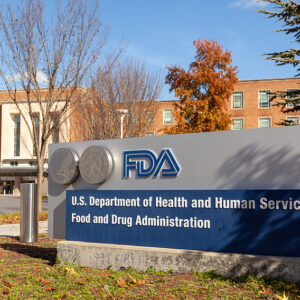Is it time to shut down the FDA?
Just days after the Food and Drug Administration released a report acknowledging its failings in the baby formula shortage, a group of former FDA employees and policy experts gathered at an InsideSources roundtable to debate the question. Dr. Richard Williams, who spent 27 years working on food safety at the FDA, said he was surprised by his own answer.
“Maybe we can make more progress if we break it up.”
It is not just formula-seeking families frustrated by the FDA’s performance. The agency, which regulates 20 percent of the U.S. consumer economy, has been at the center of some of the biggest public policy fiascos of the past five years. Critics say it needlessly delayed the rollout of COVID testing in the early days of the pandemic. Its bureaucracy has slowed the progress of potentially life-saving drugs to market. It has misinformed smokers about the benefits of switching from combustible cigarettes to alternatives like vaping. And a new investigation by Politico found that, despite having the word “food” in its name, the FDA is routinely failing at keeping unsafe foods off the market.
Williams, an economist with the Mercatus Center at George Mason University, is the author of “Fixing Food: An FDA Insider Unravels the Myths and the Solutions.” He said that even as the FDA’s performance has lagged, its budget has soared — more than doubling between 2010 to 2021 to $6.4 billion. And in the face of its recent fumbles, the agency is asking for another 30 percent budget hike. Worse, said Williams, the FDA is using its recent failings to support its requests for more money, claiming they need more resources to enforce more regulations.
“I was working on infant formula in the early 1980s when the Infant Formula Act was passed,” Williams said. “And I asked, ‘Why are there only six firms making infant formula?’ The answer was, ‘We discourage anybody else from coming into the market. We don’t want more plants to inspect, so we don’t have as much control.'”
“And how many firms are in the infant formula market today? Six.”
Chalfont pediatrician Dr. Marion Mass sees the same issue.
“This shutdown unmasked an even bigger problem — there are so few baby formula plants in the United States that a single shutdown can have major consequences, as we’ve been seeing,” she wrote for the New York Post. “That doesn’t mean we need new legislation mandating more baby-formula manufacturers and plants. In fact, the right answer is that we need less government, not more.”
Mass, who is with the group Free2Care, told DVJournal the FDA is supposed to make sure food and drugs are safe. However, with many drugs or their precursor chemicals being manufactured in China, the FDA is less able to be vigilant.
“Among the most striking effects of the overhead built into the annual national cost of our dysfunctional healthcare system, has been the outsourcing to China of the manufacture of many pharmaceuticals and medical supplies used here at home,” she said. “The effect on the quality of the supplies in America’s medicine chest has been alarming. Shortages and contaminated products are chronic and constitute a slowly unfolding healthcare crisis for the United States.”
Panelist Jack Kalavritinos, a health communications expert who has worked at both Health and Human Services and the FDA said the core issue is leadership. “Leadership matters and specific changes need to be made.”
“Right after the public health emergency was called for in January [2020] the FDA put out an odd blog,” said Kalavritinos. “It talked about how COVID tests should be limited and how there should be less authority for the private sector through expedited approval processes.”
When that was brought to HHS Secretary Alex Azar’s attention, “the secretary stepped in, he overruled that [FDA guidance], and thus began the process of unleashing the private sector,” Kalavritinos said. “It makes the point that a federal agency, at a key moment in time, should not be making policy and law through a blog post.”
And lack of leadership was part of the baby formula shortage failure, he added.
“When you shut down a plant like this, the new FDA commissioner should literally drive over to the West Wing — and bring the HHS deputy secretary with you — and say, ‘If we work fast, it will still take months to get this factory back online. But if we don’t take extraordinary actions, there will be shortages.'”
“That takes leadership, and that didn’t happen,” Kalavritinos said.
Please follow DVJournal on social media: Twitter@DVJournal or Facebook.com/DelawareValleyJournal

